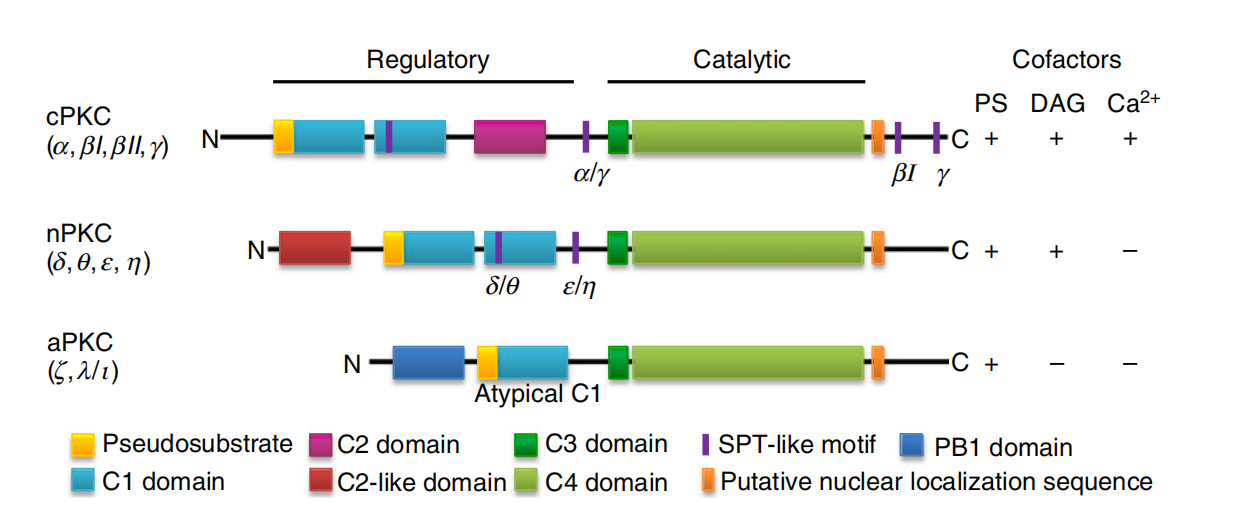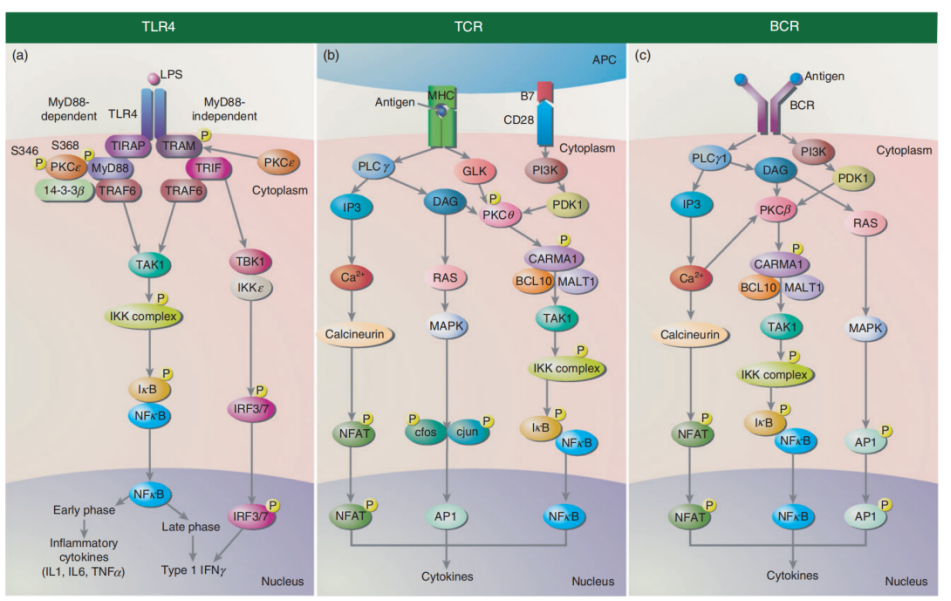The Protein Kinase C Antibody Panel Has Arrived!

Recent Advances
The Protein Kinase C (PKC) signaling pathway is a critical intracellular signaling cascade involved in the regulation of various cellular processes, including cell proliferation, differentiation, apoptosis, transcription, oncogenesis, cytotoxic effects, and cell migration. Based on their structure and activation mechanisms, PKCs can be classified into three categories:
-
Classical PKCs (cPKCs): Include the α, βI, βII, and γ isoforms. These PKC isoforms have a typical structure and can be activated by diacylglycerol (DAG), Ca2+, phosphatidylserine (PS), or phorbol esters (PMA).
-
Novel PKCs (nPKCs): Include the δ, ε, η, and θ isoforms. These PKC isoforms are activated by DAG or PMA but do not require Ca2+.
-
Atypical PKCs (aPKCs): Include the ι/λ and ζ isoforms. These isoforms are activated independently of Ca2+ or DAG but depend on PS and can be activated by phosphoinositide 3-kinase (PI3K).

Figure: Schematic diagram of the structure of Protein Kinase C (PKC) family members.
Importance of PKC Signaling
Precise control of PKC signaling amplitude is crucial for cellular and organismal health. Dysregulation of PKC activity is associated with various human diseases, including metabolic disorders, neurodegenerative diseases, autoimmune diseases, cancer, and cardiovascular diseases.
PKC signals through multiple pathways and controls the expression of genes related to cell cycle progression, tumorigenesis, and metastasis. Different PKC isoforms may act as either tumor promoters or suppressors in cancer. For example, certain isoforms (e.g., PKCα and PKCβ) are often associated with malignant phenotypes, while PKCδ is considered to have anti-cancer effects.
PKCs play a significant role in immune regulation by participating in signaling pathways critical for both innate and adaptive immunity, ultimately leading to the expression of key immune genes. Different PKC isoforms are involved in distinct signaling pathways, performing selective functions in a cell-specific manner.
-
Pathway A: PKCε plays a crucial role in macrophage activation via the TLR4 signaling pathway. LPS binding to TLR4 initiates the activation of two intracellular pathways: the MyD88-dependent and MyD88-independent pathways. In the MyD88-dependent pathway, PKCε is recruited to TLR4 via MyD88 and phosphorylated at serine 346/368, leading to the formation of a complex with TLR4, TIRAP, MyD88, and TRAF6. In the MyD88-independent pathway, TRAM is phosphorylated by PKCε, linking TLR4 to TRIF, which recruits kinases such as TAK1, TBK1, and IKKε to activate NF-κB and IRF-3/7 signaling, resulting in the production of inflammatory cytokines and type I interferons.
-
Pathway B: In T cell receptor (TCR) signaling, activation occurs when an antigen presented by an antigen-presenting cell (APC) binds to the TCR along with co-stimulatory molecules CD28 and B7. This activates the calcium signaling pathway and MAPK pathway via PLCγ1, GLK, and PI3K. DAG produced by PLCγ1 activation binds to PKCθ, which is also phosphorylated by PDK1 and GLK, leading to the activation of the NF-κB signaling pathway.
-
Pathway C: Similar to TCR signaling, B cells are activated when antigens bind to the B cell receptor (BCR), with PKCβ being the key PKC isoform involved. Calcium (Ca2+) produced by PLCγ1 activation can also activate PKCβ. Both TCR and BCR signaling pathways lead to the recruitment and activation of nuclear transcription factors (NF-κB, AP1, and NFAT), resulting in cytokine production.

Figure: Protein Kinase C (PKC) involvement in cytoplasmic signal transduction pathways in the immune system.
New Product Launch
Starter's newly launched Protein kinase C Antibody MiniAb Setis here to support your research endeavors.
For more information, please contact us.
Product Information
| Gatalog Num | Product Name | Product Parameters | Price |
| S0M1018 | Modified human Histone H3 Antibody MiniAb Set | $570 | |
| S0M1017 | Phospho-Tau Family Antibody MiniAb Set | $480 | |
| S0M1016 | Propionyl Histone H4 Antibody MiniAb Set | $210 | |
| S0M1015 | Acetyl Histone H4 Antibody MiniAb Set | $300 | |
| S0M1014 | Lactyl Histone H3 Antibody MiniAb Set | $210 | |
| S0M1013 | Crotonyl Histone H3 Antibody MiniAb Set | $300 | |
| S0M1012 | Multi-methyl Histone H3 Antibody MiniAb Set | $570 | |
| S0M1011 | Methyl Histone H3 Antibody MiniAb Set | $480 | |
| S0M1010 | Loading Control Antibody MiniAb Set | $390 | |
| S0M1009 | SMAD2/3 Antibody MiniAb Set | $300 | |
| S0M1008 | Human-Reactive STING Antibody MiniAb Set | $390 | |
| S0M1007 | Exosome Antibody MiniAb Set | Conjugation : Unconjugated | $570 |
| S0M1006 | Cell Cycle Regulation Antibody MiniAb Set | Conjugation : Unconjugated | $685 |
| S0M1005 | Autophagy Antibody MiniAb Set | Conjugation : Unconjugated | $390 |
| S0M1004 | NF-κB Pathway Antibody MiniAb Set | Conjugation : Unconjugated | $390 |
| S0M1003 | MAPK Family Antibody MiniAb Set | Conjugation : Unconjugated | $480 |
| S0M1001 | Epithelial-Mesenchymal Transition Antibody MiniAb Set | Conjugation : Unconjugated | $480 |
| S0M1019 | Protein kinase C Antibody MiniAb Set | $660 | |
| S0B4002 | Goat anti-Rabbit IgG(H+L), HRP | Host : Goat | $15 |
| Conjugation : HRP | |||
| S0B0875 | p70 S6 Kinase Recombinant Rabbit mAb (S-1278-2) | Host : Rabbit | Inquiry |
| Conjugation : Unconjugated | |||
| S0B0265 | PI3 Kinase p85α Recombinant Rabbit mAb (S-328-24) | Host : Rabbit | Inquiry |
| Conjugation : Unconjugated | |||
| S0B0904 | PI3 Kinase p110β Recombinant Rabbit mAb (S-1193-109) | Host : Rabbit | Inquiry |
| Conjugation : Unconjugated | |||
| S0B0790 | PKC eta Recombinant Rabbit mAb (S-1053-35) | Host : Rabbit | Inquiry |
| Conjugation : Unconjugated | |||
| S0B0802 | PKC zeta Recombinant Rabbit mAb (S-1306-34) | Host : Rabbit | Inquiry |
| Conjugation : Unconjugated | |||
| S0B0494 | PKC alpha Recombinant Rabbit mAb (S-624-36) | Host : Rabbit | Inquiry |
| Conjugation : Unconjugated | |||
| S0B1129 | PKC delta Recombinant Rabbit mAb (S-1667-50) | Host : Rabbit | Inquiry |
| Conjugation : Unconjugated |




